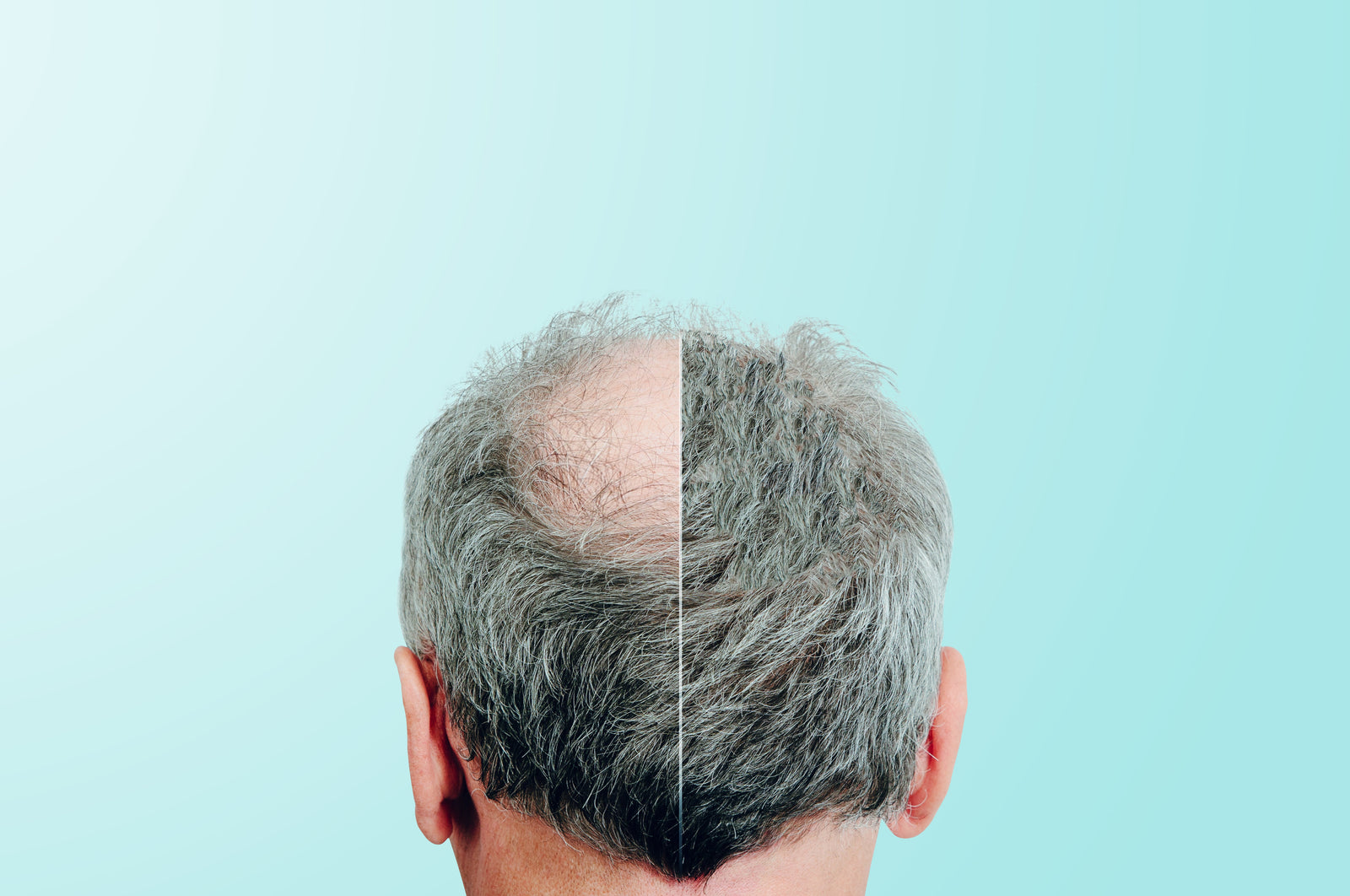Men's Hair Care: Dealing With Hair Loss

Hair loss in men is more than just a cosmetic issue—it’s deeply tied to self-esteem, emotional wellbeing, and personal identity. In a recent episode of the Age Differently Podcast, hosts Darius Naigamwalla and Peter Calin, alongside guest expert Dr. Ashkan Hayatdavoudi, unpacked the complexities that come with the loss of hair. Dr. Hayatdavoudi, CEO of AlviArmani and Contributor at Origenere, gives us a grounded, holistic look at the options available to tackle thinning hair. His professional insights, along with the hosts' personal journeys, lay out a compelling conversation for anyone grappling with hair loss.
Watch the full episode here:
Men’s Hair Care Journey From Beginning To...
Darius opens up about his personal experience, beginning to lose his hair in his late teens after the traumatic loss of his father. “One of the most emotionally-challenging things was waking up to see hair on my pillow every morning. For a 19-year-old, that’s hard.” While accessories like baseball caps helped him hide his hair loss in the 90s, coming to terms with the situation took years. Eventually, he decided to shave his head and accept his advancing male pattern hair loss.
Peter, on the other hand, started balding in his 60s. For him, it seemed like a natural part of aging. He embraced his further hair loss, largely unaffected by the physical change. It’s a notable contrast and highlights how different the emotional journey of hair loss in men can be—some feel deep anxiety, while others accept it with ease.
Why Hair Loss Hits Harder for Some
Dr. Hayatdavoudi explains that while hair loss in men is common—with half of men by age of 50 and 80% at some point in their lives—the emotional impact is very individualized. For some, signs of hair loss feels like losing a key part of their identity. "It’s not just vanity," Dr. Hayatdavoudi says. "For many men, the outside doesn’t reflect the person they feel like on the inside anymore."
The pandemic led to Darius’s first serious conversation about treatment options for hair rejuvenation. A brief joke about him wearing a rocker wig on a Zoom call was the beginning of his personal restoration journey. Dr. Hayatdavoudi encouraged him, and soon after, Darius turned to hair transplantation.

What Causes Hair Loss in Men?
But what’s going on when hair starts falling out? Dr. Hayatdavoudi breaks it down into two main factors:
- Physiology: Male hair loss often stems from androgenetic alopecia, a genetic condition where the hormone dihydrotestosterone (DHT) shrinks hair follicles. DHT is an androgen that is derived from testosterone and is critical in male sex differentiation but also leads to follicular miniaturization. This type of hair loss is driven by family history and is the most common cause of hair loss.
- Stress and Emotional Factors: Major life events, trauma, or significant stress can accelerate hair thinning. As Darius points out, the stress from losing a parent was a noticeable factor in his own hair loss.
- Alopecia Areata: An autoimmune conditioner that results in patchy bald spots, generally on the head but can also affect the beard. May be triggered by stress and conditions with hormonal changes but usually occurs without identified cause. More likely to occur in women than men.
Interestingly, stress-induced telogen effluvium (a condition where clumps of hair fall out suddenly) can be reversible. By recognizing the early signs and making lifestyle changes, men have a chance to reverse stress-related hair loss.
The Connection Between Confidence and Hair Care
Understanding why hair loss impacts different men in different ways is important. For many men, their self-worth is tied to their appearance, causing baldness to amplify insecurities. During the podcast, Darius reflects on how someone’s reflection in the mirror doesn’t always match how they feel inside: “I was a confident guy, but every time I looked in the mirror, I saw someone who didn’t quite feel like me anymore.”
Peter adds another point of view, “For me, losing hair was tied to aging more than a loss of identity, but for Darius, it was different. It really played with how he saw himself.”

Lots of Options: Where to Start?
Hair loss isn’t something men have to simply accept anymore. Medical treatments now exist for all types of hair loss. Dr. Hayatdavoudi stresses that in today’s world, multiple solutions exist for men facing hair thinning—ranging from topical treatments to surgical interventions. Here are a few solutions he discusses:
Hair Care Products: Shampoo and Conditioning
Hair care is a crucial aspect of overall self-care that goes beyond just maintaining appearances. The impact of hair loss, whether due to stress, hormonal changes, or other factors, can deeply affect one's confidence and self-image. It's interesting how different individuals perceive and react to baldness based on their personal experiences and beliefs.
Recognizing the early signs of hair loss and taking proactive steps can make a significant difference. Men are now presented with various options ranging from medical treatments to hair care products like specialized shampoos and conditioners. Dr. Hayatdavoudi recommends products free from harmful chemicals.
Topical Solutions, Oral Medications and Non-Invasive Treatments
Starting with topical solutions like minoxidil, have demonstrated varying efficacy in preventing hair loss. Topical minoxidil solutions are one of the few FDA approved therapies to prevent hair loss. Recommended dosing at 5% for men and 2% for women. It is believed that minoxidil dilates the blood vessels around the hair follicle, allowing the follicle to get more nutrients.
Topical botanical solutions like SEMPRE Growth Foam , rely on powerful botanicals to nourish the scalp, block DHT, strengthen strands and promote follicular growth.
Finasteride is another FDA approved medication for male pattern baldness that works by blocking the creation of DHT. Daily use is encouraged with these agents. Be sure to review the potential side effects with your doctor.
There has also been a medley of clinical trials on various laser treatments for hair growth. These work by triggering the biochemical cascade which leads to hair growth. Long term studies should be performed to evaluate for future sequelae of inflammation.
Minimally Invasive Procedures: Scalp Injections
Innovative treatments like injectable stem cells, PRP (Platelet-Rich Plasma), and exosomes have demonstrated amazing results. These treatments help stimulate hair follicles and encourage natural hair regrowth. While there is a growing body of evidence for these modalities in the treatment of androgenetic alopecia, these remain non FDA approved options.
Surgical Solutions: Hair Transplantation
For those looking for a more permanent solution for their pattern of hair loss, hair transplants are a widely practiced option today. As Dr. Hayatdavoudi mentions, techniques have dramatically improved in efficacy in recent years, offering natural-looking results with minimal downtime.
So, Is Hair Loss Affecting You?
Toward the end of the conversation, Peter makes a simple yet powerful suggestion: if you’re concerned about your hair loss, take a good hard look at yourself. Hold two pictures side by side—one from the past with a full head of hair, and one from now. Which version feels more authentic to the person you are?
And keep in mind, as Darius emphasizes, this is 2024, not the 80s. You have options. If you’re struggling with how you look or what you see in the mirror, options exist to bridge the gap between the inside and outside. A receding hairline no longer needs to progress to complete baldness.
Hair Care Takeaway: You Do You
Ultimately, the decision is yours. Whether you choose to embrace baldness like Peter or pursue hair rejuvenation like Darius, the important thing is managing what makes you feel comfortable. Self-awareness is key—if hair loss is affecting your confidence and mood, talk to an expert or explore your options.
There are also useful resources available for more information. As Dr. Hayatdavoudi suggests, those interested can check out comprehensive guides online about scalp health and common remedies for hair growth and healthy hair. Some helpful sources from this article below.
By handling hair loss with informed choices, men don’t need to suffer in silence or live with that feeling that something is “off.”
Origenere: All topics around hair health. Blog series include:
- Botanical Brilliance: All things botanical and hair
- The More You Know The More You Grow: Discussions around topics of hair loss.
- What's In Your Bottle?: A look at common ingredients in hair and skincare and what they do.
- Holistic Approach: Why buy it when you can make it, holistic DIY strategies for hair health.
HerHairHealth: All topics around women's hair health.
AlviArmani: Global leaders in FUE hair transplants. Check out the news section.
AgeDifferently: The Podcast for Men Over 50





Leave a comment